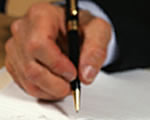 Go to main content
Go to main content
Archive Website of the UK government
Please note that this website has a UK government accesskeys system.
Main menu
Page menu
Money, tax and benefits

 Inheritance Tax and record keeping
Inheritance Tax and record keeping

It’s important to keep copies of all records when you pay Inheritance Tax on an estate or trust. This will show you’ve done everything you’re supposed to if HM Revenue & Customs (HMRC) asks to see how you arrived at your figures.
Records executors need to keep
If you’re an executor or personal representative, you must keep:
- a copy of the will
- a copy of all signed Inheritance Tax forms
- all the records and papers you used to complete the forms
- the necessary paperwork from the death of a first spouse or civil partner - in case you later want to transfer their unused Inheritance Tax threshold (or ‘nil rate band’) to the second partner upon their death (see the link to the guide on unused Inheritance Tax threshold below)
It’s useful to include any paperwork that shows how you worked out the value for certain items in the deceased’s estate, such as:
- houses and land, including farmland or woodland
- stocks and shares
- personal belongings, including jewellery or antiques
- artwork
- cars or motorcycles
- pensions
- trusts
It’s also a good idea to keep:
- the letter that HMRC will send confirming that all Inheritance Tax has been paid
- receipts from any creditors showing that their accounts have been settled
- written confirmation that all beneficiaries have received their gifts
- receipts for any expenses you incurred in your role as executor
HMRC may request a copy of these final estate accounts for their files. You should also send a copy to each of the beneficiaries.
Although it’s not legally required, it’s a good idea to keep all documents particularly if you later want to transfer an unused Inheritance Tax threshold.
Records trustees need to keep
If you’re a trustee paying Inheritance Tax on a trust, you should keep all the records and papers you used to fill in the forms in case HMRC asks to see them later.
Records beneficiaries need to keep
If you’ve inherited money or property, you should keep copies of any documentation showing you’ve received an inheritance.
If you're the surviving partner in a marriage or civil partnership, you should ask the executor for a document showing your deceased partner’s unused threshold and keep this with your papers, as it will be needed to transfer the threshold on your death.
Confirmation that you’ve paid all Inheritance Tax due
Inheritance Tax must be paid within six months after the death. However in some cases you can pay by instalments if the estate includes certain types of assets.
If you’ve supplied the necessary information on your Inheritance Tax forms and paid all the tax and interest due, HMRC will send you a letter confirming that no more Inheritance Tax is due.
You may have chosen to pay by instalments but also paid Inheritance Tax due that isn't part of the instalment plan. In this case you'll get a letter confirming that you've paid the Inheritance Tax due except for the tax due by instalments.
When all of the instalments have been paid, HMRC will send another letter to confirm that all of the tax due has been paid.
These letters mean HMRC can't ask you to pay any further Inheritance Tax on the estate in question unless:
- you haven't told HMRC about something that was relevant
- you have given false information
- further property is later shown to have been included, for example a transfer into trust
- further tax becomes payable as a result of the will being challenged or ‘varied’ (see ‘More useful links’ below)
More useful links
Provided by HM Revenue and Customs
 Facebook
Facebook Twitter
Twitter StumbleUpon
StumbleUpon Delicious
Delicious Reddit
Reddit
